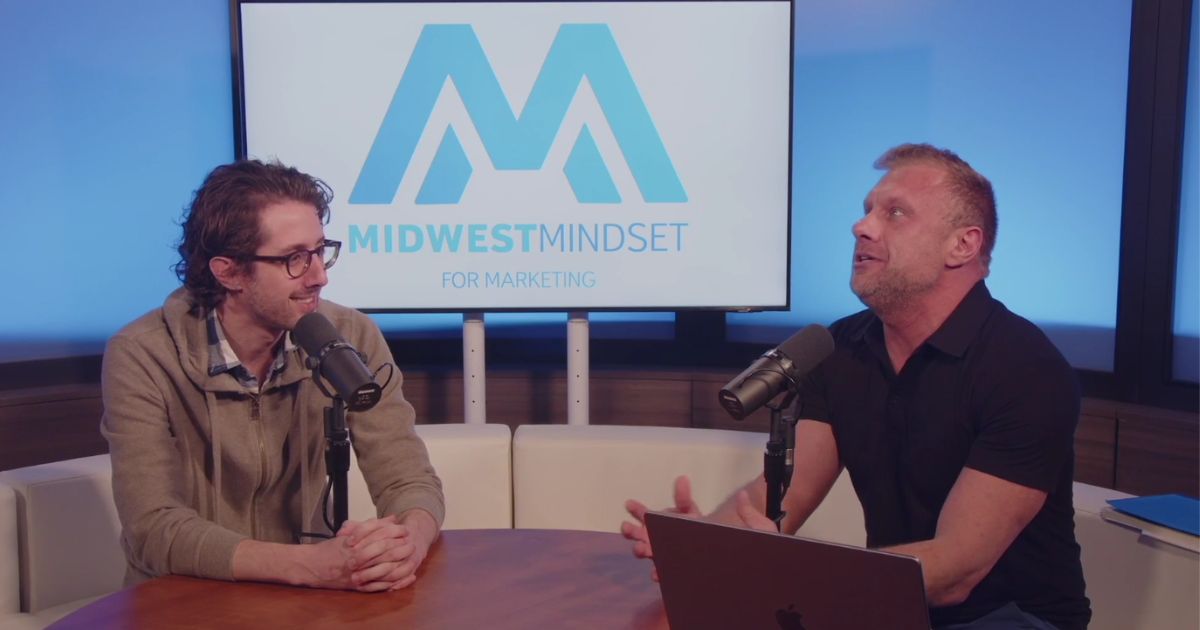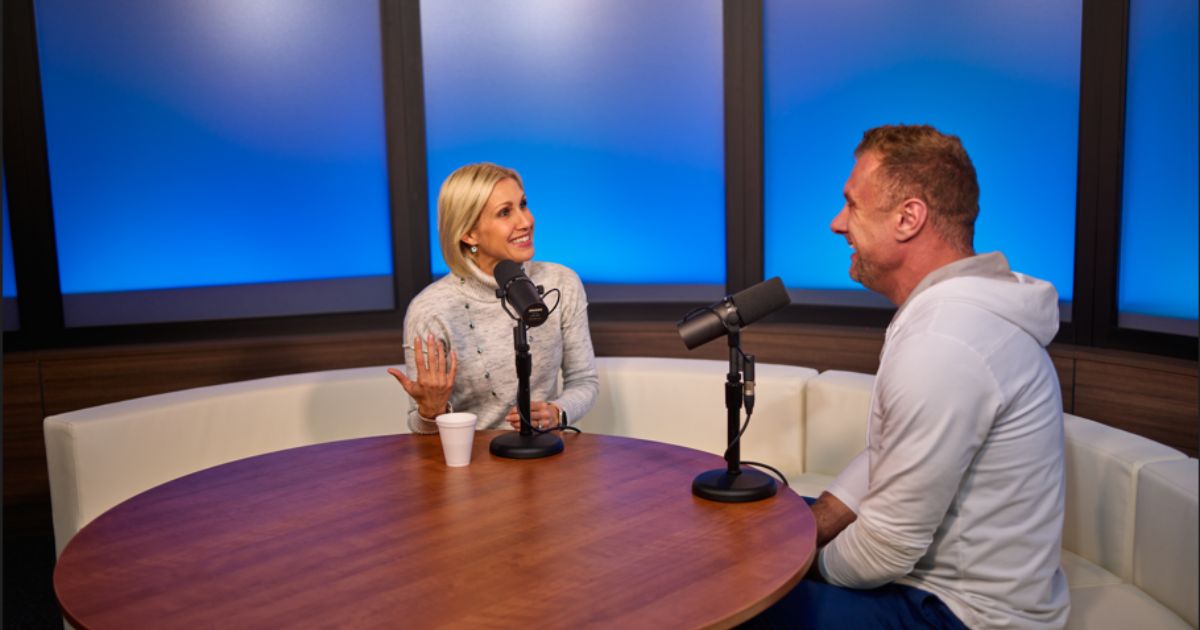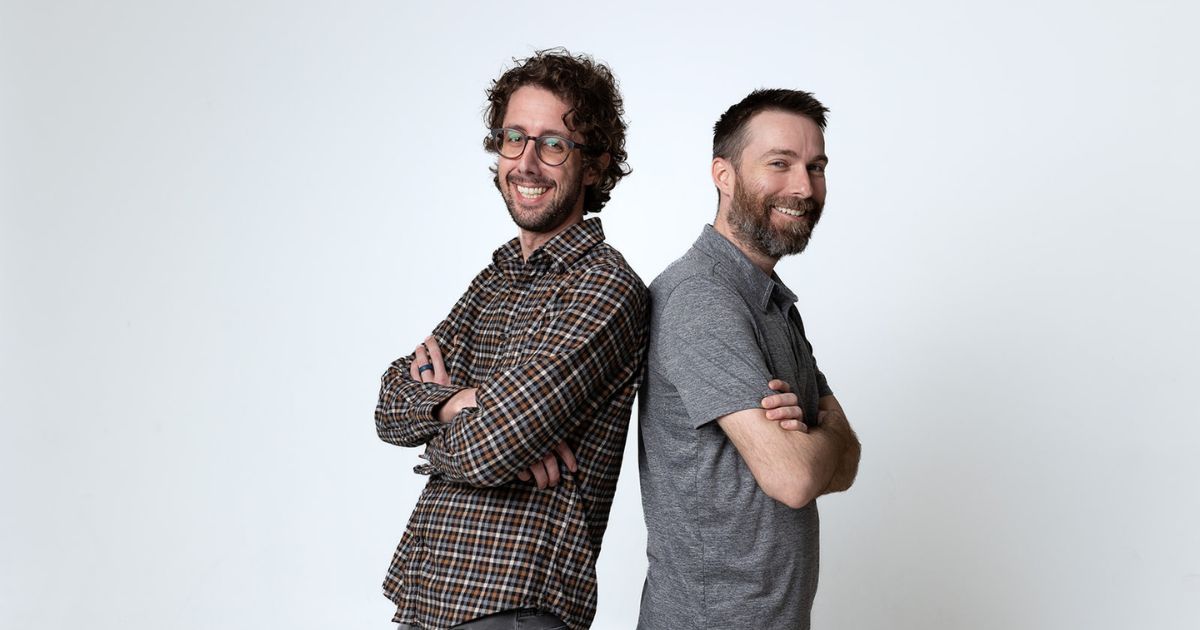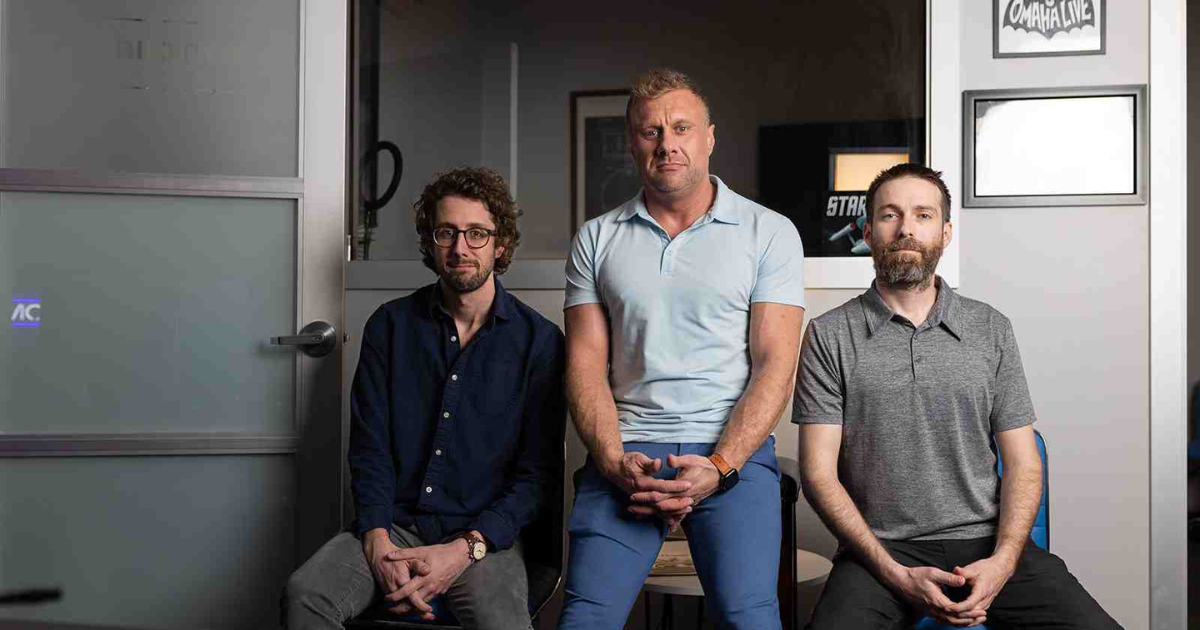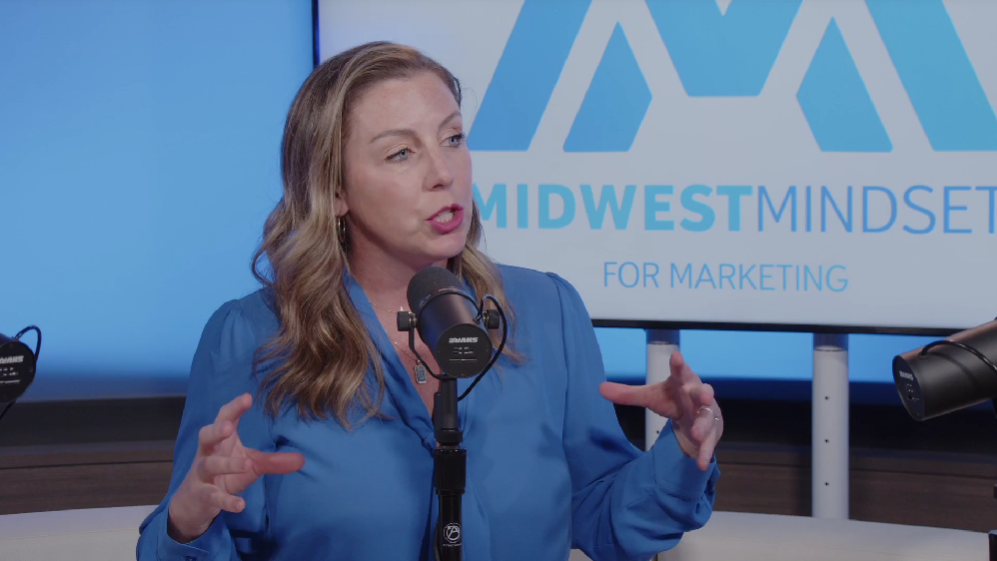Local Ads: Why Are They So Bad?
This is a written Transcription for the Midwest Mindset episode: Local Ads: Why Are They So Bad?
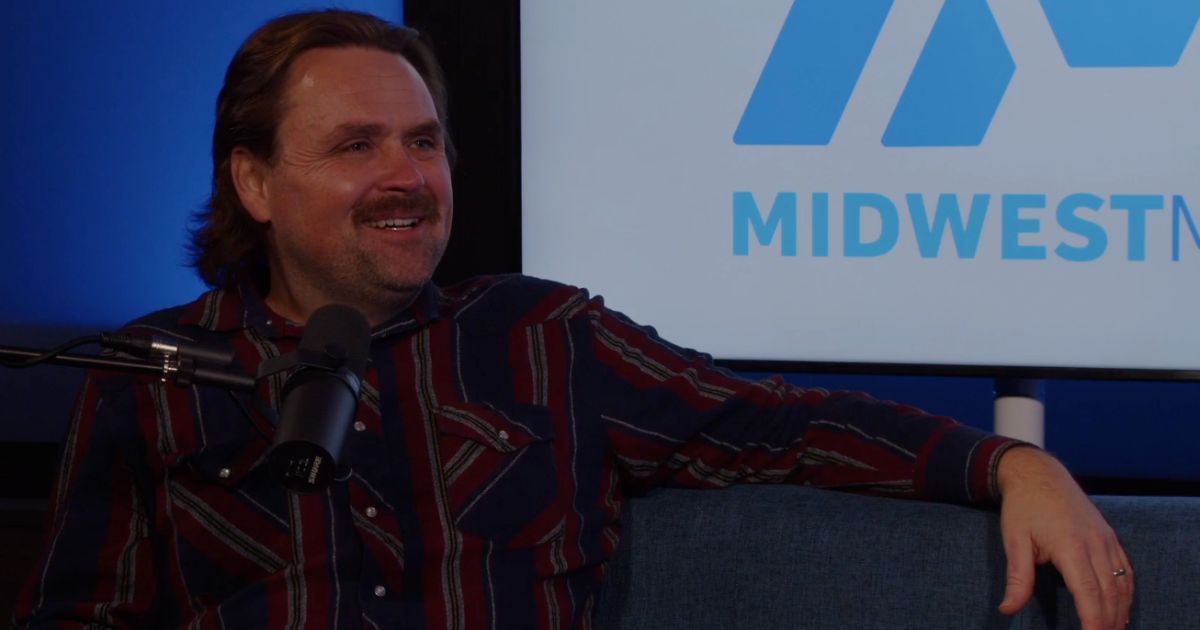
Full Written Transcript of The Episode
Local Ads: Why Are They So Bad?
Matt Tompkins: Why are local television commercials so bad? They’re awful and we all know it. We all see it. We all make fun of them. But why do they continue to be made in this episode of Midwest Mindset? We are going to answer that question why are local TV commercials so bad?
And I’m going to give you three things you need to do, or maybe not do, so that your commercial doesn’t suck to. Hello and welcome back to Midwest Mindset, the podcast that makes marketing simple and easy to do.
I’m your host, Matt Tompkins of Two Brothers Creative, where we want to make your marketing easy.
With the easy box, you give us 30 minutes, we give you 30 days of content, and we post it for you on all your socials. All of them. Yes. Joining me in the studio here today, we have the other brother of two brothers, creative.
Ben Tompkins: Oh, is that me? That’s me, that’s.
Matt Tompkins: Mikey Austin Anderson. I’ve upgraded.
Ben Tompkins: I’ve been replaced. You’ve been.
Matt Tompkins: Replaced.
Ben Tompkins: The other money. You missed it.
Matt Tompkins: Okay. The other other brother, Martin McHugh. Mayadunne’s in the studio. He’s punching up the buttons and the the knobs and a lot of gizmos and gadgets in there.
And last but certainly least, give it up for my blood brother blood.
Ben Tompkins: Brothers, Ben.
Matt Tompkins: Tompkins.
Ben Tompkins: That’s what Hopkins wanted the company name to not be two brothers. I wanted it to be Blood Brothers.
Matt Tompkins: Blood Brothers. But then true Blood came out and it was like we were like, you know, marketing, branding. We’re like, we can’t we can’t be identified too closely with vampires. Yeah.
Ben Tompkins: Do you ever just stop and think how we’re all just full of blood?
Matt Tompkins: Yes.
Austin Anderson: Oh, yeah. Did you know that blood is actually blue until it touches the air?
Matt Tompkins: I don’t think that’s true. I think that’s an urban myth.
Austin Anderson: I don’t, I think science get.
Ben Tompkins: Out, Austin out spreading misinformation.
Matt Tompkins: That’s misinformation.
Austin Anderson: That was what my kid learned it, you know, and I know.
Matt Tompkins: I’ve heard that too. But I don’t think it’s actually accurate. But I’ve heard it’s green.
Austin Anderson: Is it like ooze?
Matt Tompkins: Yes. I love how in Nebraska, here in Husker Nation, everybody says we all bleed Husker Red. And I’m like, isn’t everybody’s blood red?
Austin Anderson: Yeah, a lot of a lot of losing.
Matt Tompkins: Yeah, yeah. There’s a lot of bleeding. They can’t stop the bleeding. Now get a tourniquet out. Okay, so this is a question I think, you know, this was made relevant to me again last night watching. Have you guys ever watched local high school football? I think they call it Thursday Night Live and they have like a Friday night version.
Austin Anderson: But I want to I’ve seen clips.
Ben Tompkins: When I was a teacher, I would see clips of it and it’s yeah, it’s pretty low production.
Matt Tompkins: Yes. First off, you never see the announcers. No, you only hear them and one of them is a recognizable voice, but they never tell you who they are.
There’s not one point where they made an introduction, so it’s just some guy talking like this. I don’t know who taught sports announcers or newscasters that this is the way we want to hear them talk, because it sounds ridiculous.
Austin Anderson: It is. Where did it come from? No idea. When I watched the news, I think that I’m like, who started this? Yeah. And why? When they would go to school, they’re like, this is the way you talk or you will, why am I.
Matt Tompkins: Ending my sentence like this? Yeah, just talk normal. Like, what is the deal? What’s happening? Tell us the origin. So I’m watching it. And they have all of these, like, just shameless plugs from advertisers on there. And I don’t blame the advertisers, these companies because like, they’re hitting a market.
You know, I think it was like West Side football game. So they’re hitting the rich.
They’re in the rich, rich families, you know, Nebraska Furniture Mart ads, ortho Nebraska. I mean, these kids are going to get hurt. You might as well get the plug in now. So I don’t blame them at all.
But the way it was just presented was really cheesy. It was just a plethora of local television commercials. In fact, the entire halftime show was just one long, 20 minute commercial break and I saw so many back to.
Austin Anderson: Back, back.
Matt Tompkins: To just and they would cut back to the field, but it would be a shot at the field, and then they would cut down to the field with this pre-recorded paid advertising.
So they had like somebody from Nfm there with the guy on the sideline and he’s like, so tell us why Nebraska Furniture Mart is so amazing.
And then he would just do his, you know, obviously rehearsed lines and like the guy that they had from Nfm and I love him Nfm. But it’s not a knock on Nfm at all. Like, I mean, I love all their stuff because they.
Austin Anderson: Don’t even need to do that. They’re just doing that to support.
Matt Tompkins: They’re just doing it to support. So it’s not a knock on them. But whoever it was that was doing their public relations, he reminded me of like, you know, those inflatable arm guys they have at like, car lots. Yeah, wacky inflatable arm guys scare me.
If wacky inflatable arm thing was embodied as a human being, that would be this individual is just was talking like this. So it was just.
Ben Tompkins: The he’s a terrifying looking person you’re saying. Yeah.
Matt Tompkins: So anyhow, we’re watching this and they kept cutting all these local commercials. And that gets to today’s topic. Why are local television commercials so bad?
And I have a hunch a few reasons. Most of I mean, I’m not alone in this, right? Let me just clarify that. Like, because I’m pretty sure everybody sits and just makes fun of these terrible local television commercials when they come on their TV, right?
Austin Anderson: Oh, yeah. Yeah.
Ben Tompkins: Don’t watch local television all that much. I feel the same. I mean, not to get off track, but about local radio too, just with all these streaming services and everything, I very rarely plug in and tune in to the local the local networks.
Matt Tompkins: Yep. Well, I’m the same way.
Austin Anderson: But they’ve always been bad since they’ve always been.
Matt Tompkins: And there’s no there’s been no change. Yeah, usually the reason this happens is because what TV stations will do is they’ll say, hey, if you come to an ad budget with us. We’ll produce your commercial for free, right? That’s usually how it starts. And that is my first tip here.
So why are television local television commercials so bad? That is because, number one, you’re letting a news station produce a television commercial. Tell me, what in the world, just because they own video equipment, that’s really the only thing they have in common with, like a marketing company?
Austin Anderson: Yeah, they.
Matt Tompkins: Have no clue how marketing or advertising works. They have. All they have is you’re listening to the people who talk like this and think this is a normal way to talk, and you’re going to let them brand the company.
Austin Anderson: Shoulder pads are still in fashion. Mhm. Coming up tonight.
Matt Tompkins: We can’t have more than one woman on the screen at one time. Like it just is dumb. Like it’s so archaic and backwards. I mean I love I love anything that’s low budget Hollywood which is why I love local news broadcasts because there’s still so just there on the cusp.
Even when they have money, they don’t they still can’t just pull it all together. Yeah. You know, and it’s just fantastic to watch. It’s like watching a train wreck.
Austin Anderson: And walking into one of the buildings is like walking into the.
Ben Tompkins: 1995.
Matt Tompkins: It is. Yeah. Yeah. I mean, well that’s, that’s if you have people there anymore because somebody like a TV studio now, their new one in Omaha, where we’re based out of our home town here, Omaha, Nebraska. Midwest mindset. It’s super nice. Like it looks like you’re in like,
CNN headquarters. Oh, wow. I know W.o.w. has a new studio. That’s pretty nice. I haven’t seen the finished version. I was there when they were doing construction.
I broke in, stole some things, but I haven’t seen the finished version of it. I would say that the studio that we’re sitting in here now is the next nicest studio in Omaha behind those two, and they spent millions of dollars. I can tell you right now, we did not.
So you don’t have to have a huge budget, I guess is my point, to have a high quality product.
Ben Tompkins: But just because you have a high quality studio doesn’t mean that you know how to produce high quality and effective commercials you.
Austin Anderson: Got to have. It’s like they don’t have anyone that has an eye for it for even for their studio.
Matt Tompkins: So here’s my first tip. When you’re doing a commercial, even if you’re getting it done for free because you know everything, good quality is free, right? That’s that’s we’ve all discovered that to be true, right? Yeah. If it’s free, there’s a reason that it’s going.
Austin Anderson: To last forever.
Matt Tompkins: There’s a reason that hot dog is free, folks. It’s not real meat. But I think the first tip is don’t listen to a television news station when it comes to producing what is going to be a direct reflection of the quality of your product and service. This is a direct reflection of your company. So think of this. The first impression you have or that you give somebody is going to stick with them, likely forever. And so they’re sitting there watching television and they see multimillion dollar First National Bank commercial come on. And then they see a multimillion dollar, you know, Mercedes Benz commercial. Come on. And then they see yours and yours is it’s just it’s hard.
Austin Anderson: To even explain. It’s hard to.
Matt Tompkins: Explain how bad it is without seeing how bad these are. That is going to be what they think of you and your business. And it’s going to be it’s going to cost you so much money in the long run to try and turn that around. Now, I think there are some ways around, like if you use humor, if you’re like, hey, we’re inside, we’re in on the joke with you about how bad this commercial is.
Yeah. Um, but don’t listen to a news station to make the final decision on how you’re portrayed to the rest of the world, because that is, in a lot of ways, it’s it’s permanent.
Ben Tompkins: That back to the point that we had a couple episodes ago of just because you’re good at one thing, just because you’re good at reporting the news, doesn’t mean you’re good at coming up with effective commercials.
Matt Tompkins: I mean, news stations don’t I don’t have a clue how to run a news station. You wouldn’t put me in charge of running a news station. And I would agree with you. I’d be like, I’d be the last choice to do that. But news stations don’t know. They don’t know shit about marketing. They don’t know shit about advertising.
They don’t even know. I don’t even think they know what human beings actually enjoy, just based on the way that they talk. And like, I mean, you can tell I love going to different cities. It’s like every Walgreens and CVS is exactly the same. And every news station, the way they cover the news is all exactly the same. Yeah, the same way they speak the angles, the shots, the cutaways, all of it. It’s like it’s just rinse and repeat.
Austin Anderson: Going to break the mold. Why is everyone why is no one strayed from the format? I don’t get it. I demand answers I don’t understand.
Matt Tompkins: And they’re like, why are our ratings down so much? Let’s blame the streaming services. Yeah, maybe it’s because you’re putting out a quality product and it’s just like the same since 1985, I don’t understand, I really don’t, is it?
Austin Anderson: That is, if you have a commercial made today by a news station, it will look like 1985.
Matt Tompkins: And there are commercials from like 15, 20 years ago that businesses are still using. So we had we were we were meeting with Eric Crouch, we were doing some videos for him and he was telling us about this commercial. He did like 15, 20 years ago.
They’re still using it on the air as a commercial. So like we have like. You know, 25 year old Eric Crouch in these videos with him. And I think Tommie Frazier was in them. Right.
Austin Anderson: And people are going, man, he’s aged.
Ben Tompkins: Wow. He looks really good.
Austin Anderson: Great.
Matt Tompkins: What is the skin care treatment program he’s using? Um, one of my favorites though, because, like, here’s the local news station. They’re going to a they’re going to let they’re going to do two things. They’re going to let you run too far with this. And I’m sorry.
You’re great at running a business. You don’t know anything about marketing yourself. We think we do because we’re like, I know what’s funny, I know what’s entertaining. And if marketing was just that, if it was just coming up with a creative idea or a funny catchphrase, you’d be right.
You’d be great at it. But that’s just 2% of the equation here. And so they let business owners run with these ideas that they they are an expert on marketing advertising would tell them, would coach them and say, listen, here’s here’s the end result of what could happen here if you go this route. How about this option?
Let’s let’s flesh this out before we just do what happened in my favorite local commercial. And then I want to hear about yours. My favorite local commercial features Tommie Frazier.
And I think he’s the owner I don’t know his name of Lebanon Mattress Factory. And so in this commercial and it may still be running today, Tommie Frazier, you know, two time national championship legendary Nebraska football player.
They’re doing the traditional cuts like this mattress is 50% off. This mattress is this, this mattress is this. And then at the end they cut to this notorious scene where it features the owner of Lebda. I assume he’s the owner. Old guy looks like an owner sitting, laying in a bed like pillow behind his head, laying right next to Tommie Frazier in the bed. The owner doesn’t say one line of dialogue.
Austin Anderson: He’s just laying next to Tommie.
Matt Tompkins: Staring at Tommie with the biggest, creepiest smile on his face like. And then Tommy delivers some line, and he doesn’t do it that well. And I don’t blame Tommy. He’s not an actor, you know? He’s just. He’s.
Austin Anderson: Tommy was his line. I forgot protection so bad.
Matt Tompkins: And then after the editor didn’t cut. So then there was like a long pause. So like, Tommy goes like, yeah, stop by my friend Levita today.
And they both look at each other and then it ends. It’s like the long. It’s just awkward. It’s weird. There’s another one I saw last night. It was this guy. Apparently, there was someone at the Nebraska, like, defensive line. He’s. I guess his nickname is the polar bear. Yeah. Polar bear. Yeah. So I’m not familiar with this guy. Kind of the.
Austin Anderson: Albino.
Matt Tompkins: He’s. He’s a white.
Ben Tompkins: Is the.
Austin Anderson: Just.
Matt Tompkins: Polar? Yes. Have you seen this?
Ben Tompkins: Yeah, I’ve seen this one.
Matt Tompkins: Yeah. So this guy. So they have I’m assuming it’s probably because this is what it is to like. And that’s my next my next tip here. You don’t need to be in your own commercial. Like hire a spokesperson. Hire an actor. Come on. We’re cheap. We don’t cost a lot of money. All right. Find someone who’s charismatic within your company. The owner does not need to be in the commercial.
And we see this. I’m assuming I’m making the assumption here. I could be wrong. What I guess happened here is there was like, I’m going to put my wife and my kids in this video. They’re sitting in the living room and there’s this fake snow and they’re fake shaking like it’s cold and it just looks really cheesy.
And then the polar bear jumps up with a horrendous polar bear like head thing with not a mask, but like a mascot. Like a mascot head helmet. Yeah. And he jumps up going, ah. And then you cut to the polar bear who they do this cheesy like he slides up onto the screen. So it’s not to call it animation would be being far too.
Austin Anderson: I’ve got.
Matt Tompkins: He just slides up and he goes, hey, everybody calls me the Polar Bear. And then then I’m like, whoa, whoa, hold on a second. This is the first I’m hearing of this. Like you’re the polar is. Unless your nickname is so synonymous, like, you know, Johnny the Jet Rodgers like, okay, everybody’s calling him the jet for 50 years. Yeah. The polar bear.
Austin Anderson: Yeah. Did you name yourself?
Matt Tompkins: Did anybody validate this nickname? No.
Ben Tompkins: I think it’s the Husker. It’s a Husker football inside the Husker football community. It’s well known. Okay, the thing it’s playing on the, you know, notoriety of Husker football. He’s a Husker football player. So that’s what I think what they’re trying to go for.
Matt Tompkins: But you could do that without the commercial looking like crap. You don’t have to also make a you don’t have to make a crappy commercial. You can have fun with it. I’m not saying you don’t have fun. I’m not saying you use a spokesperson. Like even if it’s really bad acting or it’s just, hey, they’re they’re a famous player or whatever celebrity. We just want them in the commercial. That’s fine. But you don’t have to make it such a low budget thing.
Austin Anderson: I think part of the problem is, is that it’s the the sales, the sales person that’s selling the package, and then they help put together the commercial, even though they know nothing about it. And I only know that because I was with a company and building a marketing department for them.
And one of the local news stations, you know, reached out and same thing, hey, if you buy this many spots, we’ll do your commercial. So then I started going, okay, well, what would the commercial be? And we started going back and forth and she was giving me all these ideas like, okay, yeah, we could do that and this.
But she didn’t know she had no experience whatsoever in, in how to establish shots or what things would look like, like she’s just in that that’s just part of her process. Like you got to sell it, but then she’s got to help, like produce this commercial with no experience.
Ben Tompkins: But I think on the other hand, it’s about I mean, we’ve talked about perception before and we’ve talked about authenticity and the storytelling aspect.
Yes. I think you can easily produce a bad commercial, and it’s totally ineffective and does far more damage to your company than good. But then there’s also a certain level of authenticity and genuineness that comes from these people are a small business trying their best. It’s obviously they don’t have the budget that NFL does or that First National Bank does. So knowing where are you coming from?
What is your attempt like, what are you trying to really do with this and stay within that that stay within that lane because you can be cheesy, low budget, even if it’s not humorous. But if you’re authentic and people believe you, then it can be just as effective as any other commercial.
Matt Tompkins: If you’re if you’re saying we’re in on the joke with you about how low budget this is, you know that that’s true. It is, it is. I think people have in their mind they’re saving.
What I mean, you get a a, I don’t know, 3 to 5 grand around that price. You could probably get a decent production done of a commercial. You’re spending what, 20,000 or more on an ad run, like spend the extra few thousand dollars to have somebody who knows what the fuck they’re doing to produce this thing, because otherwise you’re putting that other 20 plus thousand dollars in the actual ad spend for the schedule at risk.
You can have fun, you can be authentic, you can be cheesy, you can be in on the joke. It doesn’t have to be, isn’t it? To have fly over drone shots like First National Bank or cornfields?
And you don’t have to spend $1 million, but it also doesn’t have to. To be this just crap quality thing. That is, it is far too often it just becomes you become the butt of a joke. You’re not in on the joke with with people. You’re the butt of the.
Austin Anderson: Joke, right? They’re laughing at you, not with you. And then. Yeah, to spend, you know, very little money on a commercial that you’re going to put tens of thousands of dollars behind to push out if like if you really think about it is nuts.
Matt Tompkins: Well, I think and that was my third tip. Like, cheap isn’t cheap and free isn’t free. You know, we’ve talked about how social media people have this misconception.
Well, social media is free, you know, and so I’ll just post on social media. Social media is not free unless your time has no value. So if you’re going to add up the amount of hours you’re going to have to dedicate to social media management on a daily and weekly basis, and then you say, okay, what if you spent that ten, 15, 20 hours a week getting a couple of new clients, like you’re losing a lot of money, so you’re spending money if you’re spending time, that’s just the bottom line.
And so cheap is not cheap. It’s going to cost you far more to take the cheap route in the short term than the than the long the the. If you invest money on the front end, it’s it’s going to pay off dividends in the long run because you’re going to have a video, a commercial that’s going to hold up for years. And so you can put thousands and thousands of dollars behind this thing.
You can really invest in this long term, and then you’re not you don’t risk becoming the butt of the joke. So cheap isn’t cheap. Free isn’t free.
And I would say a bonus kind of tip here, you know, don’t listen to the news stations, hire a spokesperson or an actor or somebody on on camera. Don’t be yourself that we see a lot with business. The owner and he’s on camera. And I’ve been at these shoes. Oh, yeah. Me too. If you think the final take that they actually approved to get into the commercial is bad, just imagine if you saw all the other takes where it’s like, hi, I’m reading a thing in, in front of me. And I am incapable of human emotions. Like. And is that how you want to be represented to the rest of the the the your to all of your potential prospects and customers?
Yeah. I mean, I don’t get that at all. Like you’re doing more far more harm than good.
Austin Anderson: It really is that like the perfect example is Will Ferrell in Talladega Nights where all of a sudden they’re fine, they’re talking, the camera turns on and they’re just like, what am I doing with my hands? Yeah, where do I do it? They just lock up. Well, there’s a.
Ben Tompkins: Level of, you want to be careful in telling people not to be themselves because you do want them to be themselves, but you also want people to be honest with themselves. I think that’s and if you’re honest with yourself, be honest that you shouldn’t be on camera.
You shouldn’t be the person you can hire somebody to represent. Or maybe you are really good on on camera and you can be yourself. You don’t want to be fake. I don’t think that’s the recommendation we’re telling people.
Matt Tompkins: I think it goes back to like the pitch, how they’re selling this because they’re playing to the business owner’s ego when they say, we’ll put you in the commercial. And so as the business owner, we think, oh, me, oh, shucks. Like, really? I don’t know if I could do that.
That’d be cool. And they go home and we talk about it with our spouse and we’re like, they want me to be in a TV commercial, and then they’re not on the.
Austin Anderson: You’re going to be on.
Matt Tompkins: Tv. It’s not on the business owner. I think it’s unfair to put that on the business owner. That is an injustice on the part of their kind.
Austin Anderson: Of being manipulated.
Matt Tompkins: Their they are definitely being manipulated because if the person actually cared about the end result of this video that they’re creating, they would say they would not pitch them to be in it unless they were naturally and naturally could perform, have charisma, and just actually be themselves and read a script on camera if they can. If that’s not their thing, you know, that may not be their jam, that’s fine. You know, there are so many other options because.
Austin Anderson: And it’s hard to, I think, for the sales person that sold it because they don’t want to lose the sale. So even though they might think this person is going to be terrible on camera.
Yeah. They just they go with it and they’re like, no, you’re doing great because they don’t want to say, oh, you’re doing bad. And then have that person go, I’m not on that.
Ben Tompkins: You want them. You want the customer to be honest. You want the people producing it, the business you’re working with that’s producing the commercial, to be honest as well. I mean, honesty is a huge, huge factor in producing effective marketing. Yes.
Austin Anderson: And unfortunately, most honesty in general will hurt some feelings.
Matt Tompkins: And and it’s avoided. And when we when we establish our core values I put like honesty is at the top. It’s number one. And there are a lot of times I’ve had clients where we just like, I don’t think we’re the right fit for you. Yeah. You know, and I’ll help you find what is. But, you know, I think it’s so key.
Austin Anderson: To be able to be able to do that will take you a while though. First, like just over all your years. Yeah.
Matt Tompkins: When I started out, when I first started out like you have to you’re you’re saying yes to everything and you learn really quickly because those clients that you knew, you had a hunch, this isn’t really a good fit. They end up being the whole relationship gets soured in the long run.
And so you learn some hard lessons. Like, I have to be honest with them, you know, it can’t just be about making a quick buck every chance I get. Right. And you’ll make more money in the long term if you commit to that approach.
But yeah, a lot of agencies in marketing, a lot of. A television stations. I think probably 100% of television stations, they do not have the interest, the best interest of the business owner at the forefront of this at all. They just want to make a quick buck. They want to get you to pay for ad time on their station.
They’re desperate for cash because Ben’s only watching streaming services and people aren’t watching local television anymore. You know, I mean that they are desperate to get your money, so they’re going to manipulate you and they’re going to tell you whatever they need to tell you, and they’re going to go back to this old playbook of, listen, it’s free, right? It’s free. You can’t beat that. We’re going to produce for free, and then you’re going to dump 2030.
Austin Anderson: And if it’s terrible, they’re like, well, you know, but you didn’t you were in it.
Matt Tompkins: You were in it. So that’s the reason it was terrible. It’s not on us. You know, if they really gave a shit about the business owner, they really wanted to actually help them increase sales, grow their business.
They would be honest with them and say, listen, like we would love to have you like sample. If you want to be in the commercial, we’d love to have you read some scripts, but we have actors on standby.
You know, a couple hundred bucks, 300 bucks for a day to get this person to come in. They are a professional at doing this, and so they’re going to come across in the best possible way because that’s that’s my last tip here. It’s like kind of a bonus one.
So so far the three we had don’t listen to local news stations. Cheap isn’t cheap. Free isn’t free. And hire a spokesperson or an actor unless you are naturally good at doing that. The last thing is you have to keep the customer. In first place at all times, because I don’t think I’ve ever seen a local TV commercial. Even national commercials make this mistake where they are saying the customer is the hero of this story. The business is the guide here to help them and call them to action. Give them a plan, you know, show them. Here’s what you need to do.
Business owners and you see this on I mean probably 80% of all websites. We make it all about us. And commercials are no different. We make it all about us, the business, and we don’t make it about what our business can actually do for our customers. And that is where you’re going to win. And that’s an easy thing to do. It’s just a mindset shift, right? You know, you have to say the people don’t care about your business.
They just don’t you care about your business, right. You know, that’s because you have to. People don’t care about your business. They care about what you can do, what your business can do for them. Right?
Austin Anderson: Because they just want to know how are you going to help them thrive and survive.
Matt Tompkins: So that’s why you see commercials that you initially you think they don’t make sense, like drug commercials, or it’s just like happy people frolicking in a field. Somebody’s doing, you know, sidewalk chalk, chalk art. And you’re like, what does this have to do with with.
Austin Anderson: Stds.
Multiple People: With what does this have.
Matt Tompkins: To do with shingles? Which, by the way, is it just me or the shingles? Commercial is getting a little bit terrifying these days.
Ben Tompkins: Shingles in general is terrifying.
Matt Tompkins: It’s like they’re really, really very ominous.
Ben Tompkins: One in shingles.
Matt Tompkins: Lays.
Multiple People: In death.
Matt Tompkins: Shingles lay in the darkness. And they could come out at any moment like I’m like. Yeah. But the reason they do that is because what they’re doing is they’re painting a picture of the end result of using that product or taking that drug. That’s what they’re doing, and that’s why they work. And so if you’re if you’re trying to come up with creative ideas, I would just default back to the simple premise.
All right. What is it? What’s the problem your business is solving for your customer. And then how can you paint a picture in any medium, your website, a story you tell, a blog you write, a social media post, a television commercial? How can you paint this picture of that end result of your solution to that problem?
And when you do that, you’re going to win because everybody tries to be cute, funny, creative. And when you’re having a television station, a news station produce it. It’s not going to come across as any of those things.
We’re going to laugh at it, but for all the wrong reasons. And I don’t see a lot of people keeping that that kind of mindset at the forefront.
Austin Anderson: The sales person to a lot of times is the one that’s writing the script. They gather all the information from you and from the website, and then they write it, but they’re like, they’re a sales person. Yeah, that’s their talent, that’s their craft. And then they’re like, they’re just write something. And then because I’ve read them personally with this, I’m like, what is this?
Matt Tompkins: It’s the equivalent of like and we only do this with like marketing and advertising where we think because we just let people do it right, we say, oh, you’re a sales person.
Yeah, sure you do the copywriting. You write the script for this commercial. Yeah. Let’s do it. Like we don’t do that in any other area. I don’t call a plumber to come change my tires. You know, I don’t hire an electrician to come replace my roof, you know, I mean, I, you know, I do hire Ben to build all my human cat trees because he’s good at building human cat. They’re so comfortable, among other things. But the.
Multiple People: Best.
Matt Tompkins: Human cat trees. The new running reference point. I think you’re on the podcast. But yeah, we don’t do that in any. You don’t call a your plumber to perform surgery on you. Why are you letting some person who’s an expert and good at sales do something?
They have no fucking clue what they’re doing. They have none. And that’s why these commercials start off. You have no guidance. They do not have your best interests at heart, and they’re just trying to get your money. That’s really all they’re trying to do. And you.
Austin Anderson: Know what? What I found interesting once when I was working for radio station cluster, is that like, I thought it would be best to have a copywriter who is good at writing commercials and scripts and telling stories. Write them for all the sales agents, you know, so like they do the sale, then that the copywriter gathers it, writes it and does that and then but when it ended up happening, is that a lot of these sales people, they wanted to write the scripts because that was like the fun part.
Matt Tompkins: Everybody wants to be they.
Austin Anderson: Want to be creative. But they weren’t creative. Yeah. So they didn’t want to like, let that.
Matt Tompkins: Even that wouldn’t even go to that because everybody’s creative. Everybody.
Austin Anderson: Yeah you’re right.
Matt Tompkins: But I just don’t know how to write. They don’t know how to they haven’t done any sort of training or practice or anything. They don’t know the rules of the game that we’re playing here. And then that’s what it turns out bad. It’s not that they couldn’t write right. They just don’t know how to write, you know? Yeah. Right.
Austin Anderson: Yeah. No, no I think that yeah that’s. Yeah.
Multiple People: That’s right.
Matt Tompkins: All right. For Austin, for Ben, for Martin I’m Matt Tompkins. Thank you so much for listening to Midwest Mindset. Don’t forget if you want the easy answer, the easy button if you will, to your marketing. It is the easy box. Right now the link is in the show notes.
You can get started for free. You give us 30 minutes. We. Of you 30 days of content. We do know what the f we’re doing and what we’re talking about. So you have that going for you as well.
We are not a news station, but I am going to close out the podcast like this.
